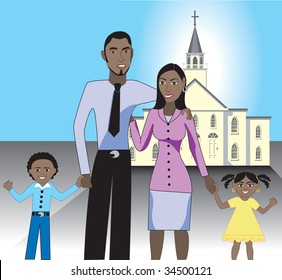Styles of African American Church Services
Have you ever wondered what an African American church service is like? They are more similar to our traditional church service but at the same time a little more different. Traditional means existing in a tradition. African Americans believe in a religion called protestant, which is the religion the African Americans believe in the most. This doesn't mean African Americans only believe in the protestant religion. They can also believe in Christianity, Baptist, Muslim, etc. These are all examples of different kinds of religions anyone can believe in.
What is an African American service like?
 |
| Figure 1 |
African American churches are more uplifting while they sing, worship, and pray. Worship means honoring your religious beliefs. Other than worshiping their religions, they want to spread their beliefs around the world. While you walk into an African American church you might see they are all dressed up and ready to worship. They get dressed up in things like suits and ties, skirts, dresses, button ups, etc (Figure 1). They are dressed up due to the fact their ancestors went to church dressed their best, so they want to keep on with the tradition of dressing up while going to church. Ancestors mean the relatives that are relatives passed your grandparents. Not like a White church, African American churches have people called ushers that greet them at the door while they walk in. If you're a first time guest, they will make sure you're pointed in the right direction to sit as close to the front as possible, so you can get a good service and maybe come back again.
What is the music like?
 As in the White churches we sing from hymnals, but in the African American it is said to be since so many African Americans come to church they are going to know at least 1,000 songs by heart! Hymnals mean a book of songs to worship your religion. During an African American service they want you to 'feel the music' like connecting with the words, like what is being said within that song. Making a connection can bring you closer to the Lord through song. Since their music in churches is different than ours, African American church musicians and pastors came together to make more than 500 different songs for their worship time at church. The most traditional music in their churches is something called 'black gospel'. The black gospel is said to be written for their enjoyment in worshiping while in church. This kind of music goes back to the 20th century! That's more than 100 years!
As in the White churches we sing from hymnals, but in the African American it is said to be since so many African Americans come to church they are going to know at least 1,000 songs by heart! Hymnals mean a book of songs to worship your religion. During an African American service they want you to 'feel the music' like connecting with the words, like what is being said within that song. Making a connection can bring you closer to the Lord through song. Since their music in churches is different than ours, African American church musicians and pastors came together to make more than 500 different songs for their worship time at church. The most traditional music in their churches is something called 'black gospel'. The black gospel is said to be written for their enjoyment in worshiping while in church. This kind of music goes back to the 20th century! That's more than 100 years!
How does the service end?
 |
| Figure 3 |
While the African American churches start with a song, do you think they end with a song as well? Due to some research, African Americans are the most religious people in the whole world (1). At the ending of their Sunday services, they sing another song so they can worship with a song one last time to end their day. In the middle of their service they take something called communion. Communion is something, not every church takes, that represents God's death on the cross. The African Americans will take one little piece of bread, and one little glass of wine. They will first pray over the wine and then pray over the bread. While the service comes to an end the pastor will ask for the choir to come back up to sing one last song. This song might be one they already sang in the beginning of the service. A choir is a group of men and women singing to a crowd of people in a church setting (Figure 3). The choir will come up and sing. After they are finished singing, the pastor will come back up and pray one last time. Then the church will be dismissed. Dismissed means to be able to go at the time it is said in a church setting. So, after the church is dismissed people can attend lunch at the church or go for lunch on their own.
Question
After reading the important parts of an African American church service, would you go to one yourself?
References
(1) Retrieved from: https://www.jstor.org/stable/2657500?seq=1#metadata_info_tab_contents





No comments:
Post a Comment